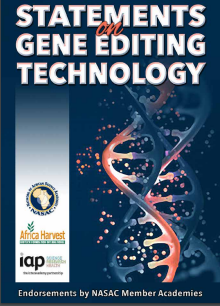
Statements on Gene Editing Technology
Gene editing enables plant breeders to make precise changes to the plant’s genetic material, with the aim of improving productivity and sustainability. It mirrors changes that occur in nature or traditional breeding; with the new plant displaying desired characteristics such as drought tolerance, disease resistance, improved yields and nutritional value, and even limited allergens. The editing tool acts within the plant cell’s DNA and no foreign DNA is added, just like in traditional breeding methods. Find more information here . Crops developed through these inexpensive novel plant breeding technologies do not contain foreign genes and are as safe as conventionally bred crops. Both developed and developing countries are successfully transforming agricultural production into sustainable systems that require less agrochemical inputs through novel plant breeding systems. However, adoption of gene editing in Africa is still limited due to lack of awareness on the technology and misinformation of linking it with genetic modification.
Goal
The main goal of this initiative is to expand and empower the working group to promote the adoption of gene editing technology in Africa that will contribute to food security. The working group would then serve as Champions, who would help to influence policymakers to create a supportive regulatory environment for the development and commercialization of gene editing technology products. The initiative also seeks to provide a platform for dialogue among relevant stakeholders, who would build public support and acceptance for the utilization of gene editing technology to improve food security in Africa.



